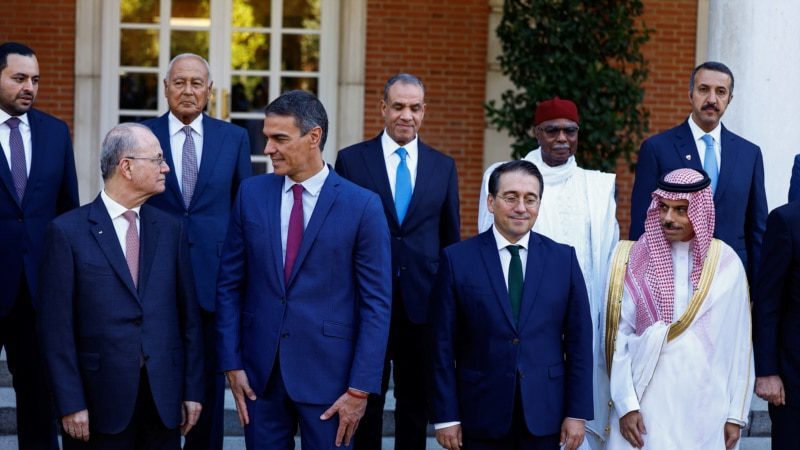BTN News: In a major international effort to end the conflict in Gaza, Spain hosted a high-level meeting on Friday, bringing together Muslim and European nations to explore solutions for peace in the Middle East. The discussions emphasized the urgent need for a two-state solution to the ongoing Israel-Palestine conflict, with Spanish officials calling for a clear timeline for the international community to implement this plan.
The meeting, held against the backdrop of an 11-month war between Israel and Hamas, is seen as a pivotal moment in the quest for lasting peace in the region. Spain’s Foreign Minister, José Manuel Albares, reiterated that the two-state solution remains the “only viable path” for peace.
A Call for Action: Implementing the Two-State Solution
Spain’s Foreign Minister, José Manuel Albares, opened the talks with a powerful message. “We are here to open a new chapter, to ensure that what has happened will never happen again,” he said. Albares called for a decisive international commitment to the two-state solution, which envisions an independent Palestinian state alongside Israel, as the only feasible resolution to the decades-long conflict.
The two-state solution, first outlined in the 1991 Madrid Conference and later reinforced in the Oslo Accords of 1993-95, has been stalled for years. However, the recent escalation of violence in Gaza and the occupied West Bank has injected new urgency into these peace efforts. According to Albares, “there is a clear willingness” among participants to move from words to action and establish a “concrete timeline” for the plan’s implementation.
Key International Players Unite for Peace
Who Was Present at the Talks?
Spain’s efforts have brought together key international figures. Attendees included European Union’s foreign policy chief, Josep Borrell, Norway’s Foreign Minister, Espen Barth Eide, and Slovenia’s Foreign Minister, Tanja Fajon. The Palestinian delegation was led by Prime Minister Mohamad Mustafa, along with representatives from the Arab-Islamic Contact Group for Gaza. Countries in this group include Egypt, Saudi Arabia, Qatar, Jordan, Indonesia, Nigeria, and Turkey.
Notable Absence: Israel
Israel did not attend the talks, a point noted by Albares, who explained that Israel was not part of the Arab-Islamic contact group organizing the discussions. However, he added that Spain is eager for Israel to “sit at any table where peace is being discussed,” making it clear that open dialogue with all parties is essential for the peace process to move forward.
Formal Recognition of a Palestinian State Gains Momentum
In a significant diplomatic development earlier this year, Spain, Norway, and Ireland formally recognized the State of Palestine, which encompasses both the Gaza Strip and the West Bank, with East Jerusalem as its capital. This move has garnered broad international support, with 146 of the 193 United Nations member states now officially recognizing Palestine’s statehood.
Spanish Prime Minister Pedro Sánchez has been a vocal advocate for the two-state solution, repeatedly emphasizing that the peaceful coexistence of two sovereign states on the land once under the British Mandate of Palestine is the “only viable path” to peace in the region.
Escalating Violence Highlights the Urgency for Peace
The meeting comes at a critical juncture, as violence continues to plague the region. Over the past 11 months, the conflict between Israel and the Palestinian militant group Hamas in Gaza has escalated to unprecedented levels, marking one of the bloodiest chapters in the long-standing Israeli-Palestinian conflict.
Beyond Gaza, tensions have also intensified in the West Bank, which remains under Israeli occupation. The territory, including East Jerusalem, was captured by Israel in the 1967 Six-Day War and has been a major point of contention ever since. The expansion of Israeli settlements in these occupied areas has further complicated peace efforts, with international bodies condemning the settlement activity as a violation of international law.
Security Concerns and Hamas Demobilization on the Agenda
Norwegian Foreign Minister Espen Barth Eide highlighted another critical issue: the future of Hamas and the demobilization of the group, which has ruled Gaza since 2007. While the peace talks focus on long-term solutions, the issue of security for Israel remains a top priority. Any peace agreement must also address Israel’s security concerns, particularly in light of the repeated rocket attacks from Gaza in recent years.
At the same time, Eide noted that the normalization of relations between Israel and several Arab countries, including Saudi Arabia, is an important aspect of the broader peace process. These diplomatic efforts could help stabilize the region and foster a more cooperative environment for peace negotiations.
The Path Forward: Can a Clear Timeline be Established?
The meeting in Spain has renewed hope for a revival of the two-state solution. Albares and other officials stressed the importance of moving beyond mere rhetoric and establishing a clear and actionable roadmap to peace. This includes pressing for Palestine’s formal membership in the United Nations and setting a timeline for the establishment of an independent Palestinian state.
Spain’s diplomatic efforts, alongside the growing international recognition of Palestinian statehood, signal that the two-state solution is gaining momentum once again. However, the success of these efforts will depend on the willingness of all parties, including Israel and Palestine, to engage in constructive dialogue and make concessions for peace.
Conclusion: A Crucial Step Toward Lasting Peace
As violence continues to escalate in Gaza and the West Bank, the international community is once again focusing on the two-state solution as the best chance for lasting peace. Spain’s role as a mediator, alongside its European and Arab partners, has brought renewed attention to the issue. While challenges remain, the meeting in Madrid may represent the first step toward ending one of the world’s most intractable conflicts.
The coming months will be crucial in determining whether the international community can establish a clear timeline for peace and bring both Israel and Palestine back to the negotiating table.


